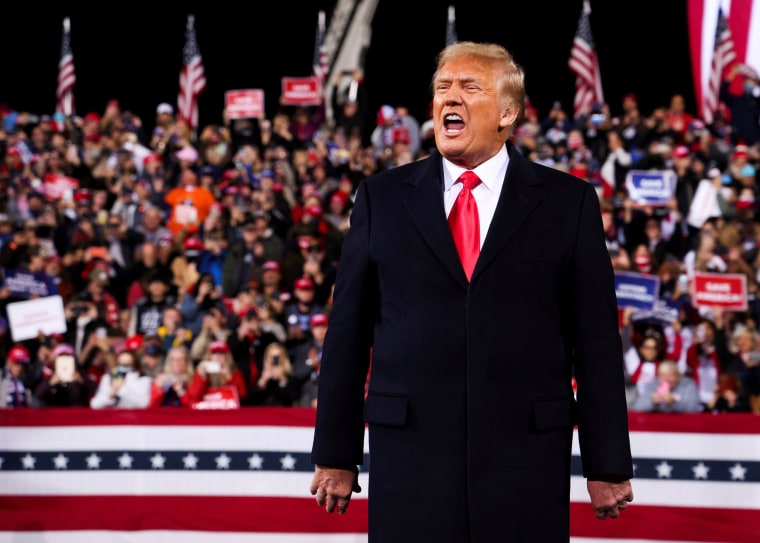What’s in an asterisk? According to a new report from a prominent risk consulting firm, it’s the biggest political risk the world faces in 2021 — bigger than oil supply brinkmanship, China trade tensions and even the Covid-19 pandemic.
Specifically, in the Eurasia Group’s new assessment of the greatest global risks this year, the top of the list is the issue it refers to as “46*” — the ongoing campaign emanating from the White House to delegitimize President-elect Joe Biden’s defeat of President Donald Trump in the election two months ago.
“The last-minute push by members of Congress to delay or derail the election certification serves as a foreboding sign of what's to come,” Ian Bremmer and Cliff Kupchan — Eurasia’s president and chairman, respectively — warned in the sharply worded report. “The more polarized the country becomes, the less likely its eroding democratic institutions will enable the compromises necessary to resolve fundamental problems.”
“The more polarized the country becomes, the less likely its eroding democratic institutions will enable the compromises necessary to resolve fundamental problems.”
Economic policymakers are facing an uphill battle to mitigate the financial fallout of the pandemic on individuals, businesses and institutions, the report said. The biggest impediment to meeting that challenge, it added, is Trump's increasingly desperate and anti-democratic gambit to hold on to power in opposition to the will of the electorate.
In addition, the diminishment of the United States on the world stage and the Trump administration’s legacy of disruption to and disengagement from the globe’s major multinational economic, humanitarian and diplomatic organizations leave the developed economy back on its heels, struggling with a leadership and power vacuum that could too easily be exploited by China, according to the Eurasia Group. “There is no global leadership on political models, trade standards, and international architecture to follow,” it warned.
American economists and policy experts were, by and large, more sanguine, arguing that once deprived of the White House as a bully pulpit and no longer afforded exemptions from social media platforms’ content rules, Trump would largely be limited to being an agitator within the already-fractured ranks of his own party. “His millions of voters will pay less attention to his crazy tweets as the world moves on,” said Peter Petri, a professor of international finance at the Brandeis International Business School.
Many said ideological skirmishes paled in comparison to the looming — and growing — Covid-19 pandemic.
“I think the number one risk has got to be the pandemic,” said Mark Zandi, chief economist at Moody’s Analytics. “At this point, it's about distributing the vaccine and getting people to take it.”
While the economic headwind of political uncertainty isn’t a new risk, though, partisan gridlock could stymie the Biden administration’s economic plans for pandemic recovery. “It might impede the ability to pass additional legislation,” Zandi said. Less rancor in Washington, D.C., also would give policymakers the opportunity to address other global risks identified in the Eurasia Group’s report, which included climate change, cybersecurity vulnerabilities and a power vacuum in the E.U. following the departure of Angela Merkel.
Some experts asserted that the scope and severity of Covid-19’s destructiveness in the United States was an outgrowth of the federal government’s dysfunction — thereby making the unwillingness of one political party to endorse a peaceful transfer of power a greater threat than the disease itself.
“Continuing political paralysis in the U.S. seems a plausible number one to be because it links to so many issues… It’s the political paralysis that essentially enhances the risk of the virus,” said David Dollar, a senior fellow at the Brookings Institution. “If we had a well-functioning government and coordination between the parties, we could do a lot to reduce the spread of the virus,” he said, such as implement national protocols and centrally coordinate vaccine distribution.
“I’m not sure I share the bleakness of the outlook. However, I certainly believe the risk of delegitimizing Joe Biden… will prove to be a very severe threat to the functioning of democracy in the United States,” said Jacob Kirkegaard, a senior fellow at the Peterson Institute for International Economics.
Major business trade groups including the U.S. Chamber of Commerce, the National Association of Manufacturers and the Business Roundtable all issued statements on Monday opposing efforts to overturn the election.
“With our country in the midst of a pandemic, business leaders recognize that ongoing division and distrust in our political system threatens the economic recovery and job creation our country desperately needs," the Business Roundtable said in a statement Monday. "The integrity of the 2020 presidential election is not in doubt."
Kirkegaard added there was hope to be drawn from the inevitable departure of the Trump administration, which could swiftly pave the way for a more comprehensive, cogent federal response to the Covid-19 epidemic. “The biggest risk is the rollout of the vaccine — that’s one that can be competently managed within the Executive Branch,” he said. “I don't see how Congressional gridlock is going to be able to sabotage it in the way that the Trump administration’s combination of incompetence and unwillingness to do this has done.”
Effective containment of the virus on Biden’s part would go a long way in establishing legitimacy among the percentage of the electorate whose grievances have been stoked by Trump’s baseless allegations of a “stolen” election, Petri added.
“Sane government and tangible successes will give the new president greater running room to score victories,” he said.
